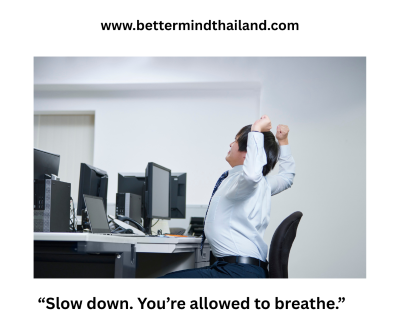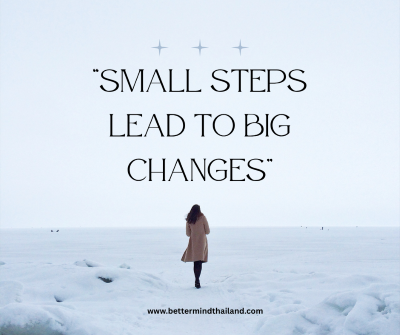5 Signs You Might Be Experiencing Burnout Without Realizing It
2122 จำนวนผู้เข้าชม |

5 Signs You Might Be Experiencing Burnout Without Realizing It

Dr. Marid Kaewchinda (Ph.D)
Expert Counseling Psychologist specializing in EMDR and Brainspotting Therapy
What Is “Burnout”?
Burnout is a state of emotional, physical, and mental exhaustion caused by prolonged stress or overwhelming demands. You may feel drained, lose motivation, and struggle to find meaning in what you used to enjoy.
While it might seem like “just being tired,” unchecked burnout can lead to depression or chronic anxiety over time.

5 Common Signs of Burnout You Might Overlook
1. You feel exhausted even after resting
No matter how much you sleep, you still wake up feeling tired or emotionally drained.
2. You’ve lost motivation or passion
Tasks that once excited you now feel meaningless or burdensome.
3. You’re easily irritated or emotionally reactive
You find yourself snapping at others or feeling annoyed over small things.
4. You feel unworthy or question your self-value
Persistent self-doubt or feelings of failure become your inner dialogue.
5. Your body is showing signs of stress
Frequent headaches, insomnia, tense muscles, or stomach discomfort are your body’s way of saying “slow down.”

How to Recover from Burnout
- Allow yourself to rest without guilt.
- Separate your self-worth from your productivity.
- Talk to someone you trust or seek support from a psychologist.
- Consider therapeutic methods like EMDR Therapy to release emotional stress and regain balance.
Burnout doesn’t happen overnight — it builds up quietly when you keep pushing through without care for your emotional limits.
If you notice these signs in yourself, remember that reaching out for help is a sign of strength.
Better Mind is here to support you toward healing, balance, and renewed energy.

FAQ
1. How is burnout different from regular stress?
Regular stress is temporary and improves with rest. Burnout is chronic emotional and physical exhaustion that doesn’t go away even after sleeping or relaxing.
2. What causes burnout?
Common causes include excessive workload, constant pressure, poor work-life balance, high self-expectation, and stressful environments over time.
3. Can burnout be treated?
Absolutely. Recovery includes resting properly, setting boundaries, improving lifestyle balance, and seeking therapy when needed.
4. What should I do if I suspect I’m experiencing burnout?
Start by resting, reducing unnecessary tasks, talking to someone you trust, and consulting with a mental health professional to create a personalized recovery plan.
5. Can burnout lead to depression?
Yes. Prolonged burnout increases the risk of developing depression and anxiety, especially if ignored for a long time.
6. Can EMDR Therapy help with burnout?
EMDR Therapy can reduce emotional stress, release past pressure, and improve mental resilience, making it helpful in burnout recovery.
7. Should I see a psychiatrist or a psychologist for burnout?
A psychiatrist can help if you need medication for severe symptoms (insomnia, panic, persistent low mood).
A psychologist is ideal for talk therapy, emotional processing, and deeper behavioral change.







